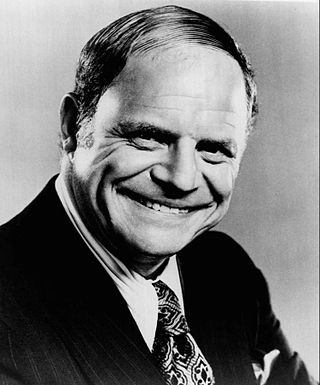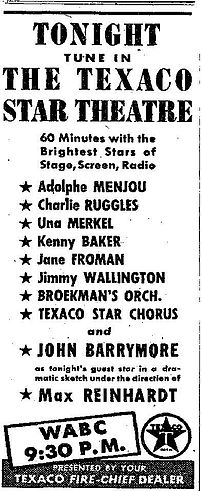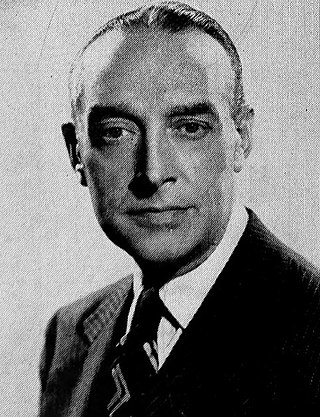
Milton Berle was an American actor and comedian. His career as an entertainer spanned over eight decades, first in silent films and on stage as a child actor, then in radio, movies and television. As the host of NBC's Texaco Star Theatre (1948–1953), he was the first major American television star and was known to millions of viewers as "Uncle Miltie" and "Mr. Television" during the first Golden Age of Television. He was honored with two stars on the Hollywood Walk of Fame for his work in both radio and TV.

Donald Jay Rickles was an American stand-up comedian and actor. He was known primarily for his insult comedy. His film roles include Run Silent, Run Deep (1958), Enter Laughing (1967), Kelly's Heroes (1970), and Casino (1995). From 1976 to 1978, Rickles had a two-season starring role in the NBC television sitcom C.P.O. Sharkey, having previously starred in two eponymous half-hour programs, an ABC variety series titled The Don Rickles Show (1968) and a CBS sitcom identically titled The Don Rickles Show (1972).
The year 1957 in television involved some significant events. Below is a list of television-related events during 1957.
The year 1956 in television involved some significant events. Below is a list of television-related events during 1956.
The year 1955 in television involved some significant events. Below is a list of television-related events during 1955.

Texaco Star Theater is an American comedy-variety show, broadcast on radio from 1938 to 1949 and telecast from 1948 to 1956. It was one of the first successful examples of American television broadcasting, remembered as the show that gave Milton Berle the nickname "Mr. Television".

The Dean Martin Show is a TV variety-comedy series that ran from 1965 to 1974 for 264 episodes. It was broadcast by NBC and hosted by Dean Martin. The theme song to the series was his 1964 hit "Everybody Loves Somebody".

John Hamilton Davidson is an American actor, singer, and game show host known for hosting That's Incredible!,Time Machine, and Hollywood Squares in the 1980s, and a revival of The $100,000 Pyramid in 1991.

The Hollywood Palace was an hourlong American television variety show broadcast Saturday nights on ABC from January 4, 1964, to February 7, 1970. Titled The Saturday Night Hollywood Palace for its first few weeks, it began as a midseason replacement for The Jerry Lewis Show, another variety show, which lasted only three months.

A roast is a form of insult comedy, originating in American humor, in which a specific individual, a guest of honor, is subjected to jokes at their expense, as well as genuine praise and tributes. The assumption is that the roastee can take the jokes in good humor and not as serious criticism or insult. The individual is surrounded by friends, fans, and well-wishers, who can receive some of the same treatment during the evening. The host of the event is called the roastmaster, since it rhymes with and plays on toastmaster. Anyone mocked in such a way is said to have been roasted.

NBC Studios are located in the historic 30 Rockefeller Plaza in Manhattan, New York City. The building houses the NBC television network headquarters, its parent NBCUniversal, and NBC's flagship station WNBC, as well as cable news channel MSNBC.
The Des O'Connor Show is a British variety and chat show hosted by Des O'Connor which was broadcast on ITV from 1963 until 1973.
The Kraft Summer Music Hall is a 1966 television music comedy series broadcast in America. It was written by George Carlin, starring John Davidson as the host. The hour-long show was produced by Bob Banner. It was the summer replacement for The Andy Williams Show and Perry Como's Kraft Music Hall. The show aired from June 6 to August 29, 1966.

The Kraft Music Hall was a popular old-time radio variety program, featuring top show business entertainers, which aired first on NBC radio from 1933 to 1949.

The Friars Club was a private club in New York City. Famous for its risqué roasts, the club's membership is composed mostly of people who work in show business. Founded in 1904, it was located at 57 East 55th Street, between Park Avenue and Madison Avenue, in the historic Martin Erdmann House, now known as the Monastery.

Frank Gallop was an American radio and television personality who was born in Boston, Massachusetts and died in Palm Beach, Florida.
Perry Como was an American singer, radio and television performer whose career covered more than fifty years. He is probably best known for his television shows and specials over a period of almost thirty years. Como came to television in 1948 when his radio show was selected by NBC for experimental television broadcasts. His television programs were seen in more than a dozen countries, making Como a familiar presence outside of the United States and Canada.
The Dean Martin Celebrity Roast is an American series of television specials hosted by entertainer Dean Martin and airing from 1974 to 1984. For a series of 54 specials and shows, Martin and his friends would "roast" a celebrity. The roasts were patterned after the roasts held at the New York Friars' Club.
Clark Jones was an American television director. He gained acclaim in the early days of television as a director of live programming.
Woody Allen Looks at 1967 is a television special that premiered on NBC on December 27, 1967, starring stand-up comedian Woody Allen. Allen hosted the show produced by Kraft Music Hall, in which he opens with a standup monologue and acts in a series of comedy skits alongside Liza Minnelli. He also has a conversation with guest and public intellectual and noted conservative William F. Buckley Jr. as they talk about the year 1967 and make jokes at each other's expense. Motown singer Aretha Franklin serves as the musical guest.











